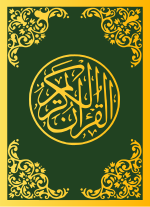
The Quran, also romanized Qur'an or Koran, is the central religious text of Islam, believed by Muslims to be a revelation from God. It is organized in 114 chapters, which consist of verses. In addition to its religious significance, it is widely regarded as the finest work in Arabic literature, and has significantly influenced the Arabic language.

Translations of the Qurʻan are considered interpretations of the scripture of Islam in languages other than Arabic. The Qurʻan was originally written in the Arabic language and has been translated into most major African, Asian and European languages.
Arthur John Arberry FBA was a British scholar of Arabic literature, Persian studies, and Islamic studies. He was educated at Portsmouth Grammar School and Pembroke College, Cambridge. His English translation of the Qur'an, The Koran Interpreted, is popular amongst academics worldwide.

Maryam is the 19th chapter (sūrah) of the Qur'an with 98 verses (āyāt). The 114 chapters in the Quran are roughly ordered by size. The Quranic chapter is named after Mary, mother of Jesus (Isa), and the Virgin Mary in Christian belief. It recounts the events leading up to the birth of Jesus, subject matter covered in Luke 1 of the Christian Bible. The text of the surah refers to many known prophetic figures, including Isaac, Jacob, Moses, Aaron, Ishmael, Enoch aka Idris, Adam, Zechariah and Noah.

An-Naml is the 27th chapter (sūrah) of the Qur'an with 93 verses (āyāt).

Ar-Rahman is the 55th Chapter (Surah) of the Qur'an, with 78 verses (āyāt).

Al-Muzzammil is the seventy-third chapter (sūrah) of the Qur'an, containing 20 verses (āyāt), which are recognized by Muslims as the word of God (Allah).

The Holy Qur'an: Text, Translation and Commentary is an English translation of the Qur'an by the British Indian Abdullah Yusuf Ali (1872–1953) during the British Raj. It has become among the most widely known English translations of the Qur'an, due in part to its prodigious use of footnotes, and its distribution and subsidization by Saudi Arabian beneficiaries during the late 20th century.

In Islam, ’i‘jāz or inimitability of the Qur’ān is the doctrine which holds that the Qur’ān has a miraculous quality, both in content and in form, that no human speech can match. According to this doctrine the Qur'an is a miracle and its inimitability is the proof granted to Muhammad in authentication of his prophetic status. It serves the dual purpose of proving the authenticity of its divineness as being a source from the creator; and proving the genuineness of Muhammad's prophethood to whom it was revealed as he was one bringing the message.

The Syro-Aramaic Reading of the Koran: A Contribution to the Decoding of the Language of the Koran is an English-language edition (2007) of Die syro-aramäische Lesart des Koran: Ein Beitrag zur Entschlüsselung der Koransprache (2000) by Christoph Luxenberg.

There are many English translations of the Quran. The first translations were created in the 17th and 19th centuries, but the majority of existing translations have been produced in the 20th and 21st centuries.

John Medows Rodwell (1808–1900) was a friend of Charles Darwin while both matriculated at Cambridge. He became an English clergyman of the Church of England and an Islamic studies scholar. He served as Rector of St.Peter's, Saffron Hill, London 1836-43 and Rector of St Ethelburga's, Bishopsgate, London from 1843–1900. He and Darwin maintained a correspondence after their graduation.

The Noble Qur'an is a translation of the Quran by Muhammad Muhsin Khan and Muhammad Taqi-ud-Din al-Hilali. It is available in many languages and is "widely and freely distributed to hajj pilgrims". It is published and printed at the King Fahd Complex for the Printing of the Holy Quran, which is said to produce ten million copies of the Quran every year.
Khaleel Mohammed was a Guyanese-born professor of Religion at San Diego State University (SDSU), in San Diego, California, a member of Homeland Security Master's Program, and, as of January 2021, Director of SDSU's Center for Islamic and Arabic Studies.

Criticism of the Quran is an interdisciplinary field of study concerning the factual accuracy of the claims and the moral tenability of the commands made in the Quran, the holy book of Islam. The Quran is viewed to be the scriptural foundation of Islam and is believed by Muslims to have been sent down by God (Allah) and revealed to Muhammad by the angel Jabreel (Gabriel). It has been subject to criticism both in the sense of being studied by mostly secular Western scholars and in being found fault with.

An-Nisa 4:34 is the 34th verse in the fourth chapter of the Quran. This verse adjudges the role of a husband as protector and maintainer of his wife and how he should deal with disloyalty on her part. Scholars vastly differ on the implications of this verse, with many Muslim apologists arguing that it serves as a deterrent from anger-based domestic violence. The translation of the verse is also subject to debate among Muslim scholars, which can read 'strike them [wives]' or '(lightly) strike them' or 'beat them' or 'scourge them', depending on the translator. Furthermore, as that said in a hadith transmitted by Abu Huraira, slapping someone across their face was forbidden.
Muhammad A. S. Abdel Haleem, , is the King Fahd Professor of Islamic Studies at the School of Oriental and African Studies, University of London (SOAS) in London, England, and editor of the Journal of Qur'anic Studies.
Islamic holy books are the texts which Muslims believe were authored by Allah through various prophets throughout humanity's history. All these books, in Muslim belief, promulgated the code and laws that God ordained for those people.
Muhammad Taqi-ud-Din bin Abdil-Qadir Al-Hilali was a 20th-century Moroccan Salafi, most notable for his English translations of Sahih Bukhari and, along with Muhammad Muhsin Khan, the Qur'an, entitled The Noble Qur'an.







